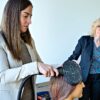In an effort to help people living with treatment-resistant depression – those who have failed to respond to one or more different antidepressant medications – Dr. Sara Tremblay, a scientist at The Royal’s Institute of Mental Health Research, has been tirelessly working for the past two years to bring an rTMS clinical-research platform to The Royal.
Repetitive transcranial magnetic stimulation (rTMS) is a type of neuromodulation that directly stimulates the specific brain circuit known to be dysfunctional in people with major depression. This is done by producing a brief and painless magnetic field that is delivered via a coil placed against the scalp.
“Across the mental health landscape, clinicians, researchers and patients are all becoming increasingly aware that there is an urgent need for new, alternative therapies for mental health disorders,” says Dr. Tremblay. “Neuromodulation offers us a whole new way of looking at mental health treatment, where we can identify malfunctioning circuits in the brain and effectively treat them in a non-drug, non-invasive way.”
(Sponsored)

Ottawa businesses critically important to ending youth homelessness across the city
Local businesses joining United Way East Ontario’s effort to prevent and end youth homelessness not only helps build a stronger, safer, and healthier community, but gives a boost to Ottawa’s

Local businesses face hiring obstacles due to immigration pullback, flawed screening
In his 39 years of practicing immigration law, Warren Creates (a rare Law Society Certified Specialist) has never seen an environment so challenging for employers looking to hire workers from

This dream of Dr. Tremblay’s became a reality in January 2020. The Royal’s new rTMS clinical-research platform is the first of its kind in the Ottawa region and is quickly becoming a much sought-after treatment for depression.
A preferred treatment
Unlike other treatments, such as antidepressant medication and electroconvulsive therapy, rTMS has very few side effects. Additionally, rTMS sidesteps some of the traditional obstacles to treating young adults with depression. Youth and young adults who take antidepressant medications, for example, may experience behavioural, emotional and physical changes. Many elderly patients are also limited in their use of antidepressant drugs because of poor kidney or liver function. rTMS as an alternative to drug interventions is useful for a wide range of people.
Health Canada approved rTMS in 2002, but unfortunately only three jurisdictions – Saskatchewan, Quebec and Yukon – have publicly funded this innovative treatment. Those who live in large urban centres with private clinics can pay out of pocket for treatment. But for many, the only other way to access rTMS is through research.
Approximately 50 per cent see a significant reduction in their symptoms – which includes 30 per cent who achieve complete remission.
Through this clinical-research platform at The Royal, Dr. Tremblay’s goal is to offer treatment to as many people as she can while collecting research data to help better predict and refine rTMS treatment on a continuous basis.
“Research in this area is leading to a better, more personalized standard of care for patients with depression and related mental health disorders, for whom traditional treatments haven’t worked,” says Dr. Tremblay.
For a period of four to six weeks, five days a week, study participants come to The Royal for a 20-minute session in which rTMS is applied for four minutes.
Although this may seem like a big time commitment, the results from rTMS have been quite positive. In fact, recent large trials have shown response rates similar to antidepressant medications; approximately 50 per cent see a significant reduction in their symptoms – which includes 30 per cent who achieve complete remission.
The ultimate goal is to eventually obtain the necessary funding to expand upon the current rTMS clinical-research platform and to offer different types of rTMS treatments to individuals with treatment-resistant depression as well as for individuals living with other mental health disorders such as post-traumatic stress disorder and schizophrenia.
An rTMS clinical program would provide patients with a fast, free, safe and effective method to help treat chronic and treatment-resistant mental health disorders.
Read the full report from The Royal Ottawa Foundation for Mental Health below:




